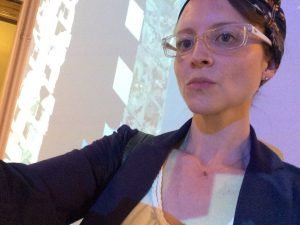
Beginning in Fall 2020, Duke began supporting the social annotation tool Hypothes.is through a pilot program. Now integrated in Sakai, Hypothes.is can be used by instructors and students to read a text together by leaving annotations directly in the margins of web pages and PDFs. Instructors across Duke, teaching courses of varying discipline and size, have integrated the tool into their classroom this academic year.
Dr. Amanda Starling Gould, Senior Program Coordinator for Educational Programs & Digital Humanities at the John Hope Franklin Humanities Institute, is currently using the Hypothes.is-Sakai integration in her online graduate seminar, ReDesigning the Future: Radical Innovation After COVID, for Duke’s Graduate Liberal Studies program.
“In this class we investigate how our systems — our objects, environments, technologies, policies and cultural practices — design us, and how we can redesign those systems in line with our visions for more-livable, more-inclusive futures,” Gould said.
Annotating Course Materials
The documents the class has annotated with Hypothes.is are diverse, ranging from book chapters and published articles, to websites and video transcripts, to even their class syllabus.
“Annotating the syllabus allows students to add comments and questions to the course plan,” Gould said. “Annotating the syllabus live, in-class gives us an opportunity to openly discuss any confusing bits, and it opens conversation about particular aspects of the class. Students can add values statements and clarifying points to the inclusion statement, for instance, or ask questions about the collaborative grading system.”
The openness Gould demonstrates in her syllabus annotation activity is evident in how she approaches her use of Hypothes.is in ReDesigning the Future: Radical Innovation After COVID.
Rather than requiring annotations, grading assignments or prescribing how to use Hypothes.is, Gould said she offered the tool as an opportunity for the students to connect with each other, while also connecting with the text.
“It opens another dynamic space for students to engage the class content, and each other, in an online-only course,” she said
This means, in Gould’s words, that graduate students in the course are “mapping their own preferred practices for use.”
Building Community
The tool allows the graduate students to build community asynchronously, as Gould describes: “They are having conversations with each other all while having a conversation with the author of the assigned work. It gives me an opportunity to join that conversation, as well, and it points to ideas within the text that we can bring up in our weekly Zoom sessions.”
While there are many digital education tools dedicated to enabling asynchronous communication between students and instructors, such as Sakai forums, Piazza or blog tools, Gould said she sees Hypothes.is generating ideas in a way these tools “neither provoke nor promote.”
Unlike these tools, Gould noted that, “Hypothes.is gives us a focused window around a text where we can gather together to directly engage with it and with each other about it. Students can highlight text, comment directly on certain passages, and can respond to other students’ annotations.”
To Gould, social annotation allows for both well-thought-out and quick responses to the text.
Integrating Hypothes.is into Your Course
Gould said that, for faculty facilitating a graduate student seminar, she recommends, if the design of the course permits it, to “invite the students to decide together — without the pressures of grades or requisites — how and if they might like to use the tool. A voluntary engagement might be richer, more robust and more useful for students.”
For instructors working with undergraduates or larger courses, Gould recommends this Twitter thread by Dr. Mary Klann, whose suggestions she would adopt:
After ending the 2020-21 pilot, Duke reached an agreement with Hypothes.is for a limited license for the 2021-22 academic year. If you are interested in having Hypothes.is added to your Sakai course site, please email us at learninginnovation@duke.edu.
For one-on-one help with course design or Hypothes.is support, you can visit Learning Innovation office hours every Monday, Wednesday and Thursday from 1-3 p.m. EDT at duke.zoom.us/my/dukelearninginnovation.

